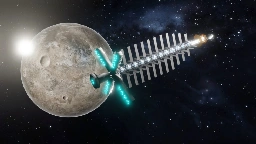Nuclear propulsion system proposed for European space missions
Nuclear propulsion system proposed for European space missions
A consortium led by Belgian engineering firm Tractebel has completed the European Space Agency-commissioned RocketRoll project on nuclear electric propulsion for space exploration. The consortium has defined a comprehensive technology roadmap to equip Europe with advanced propulsion systems capable ...

A consortium led by Belgian engineering firm Tractebel has completed the European Space Agency-commissioned RocketRoll project on nuclear electric propulsion for space exploration. The consortium has defined a comprehensive technology roadmap to equip Europe with advanced propulsion systems capable of undertaking long-duration missions.
The RocketRoll project - or 'Preliminary European Reckon on Nuclear Electric Propulsion for Space Applications' - brought together leading stakeholders in aerospace and nuclear within a consortium led by Tractebel that includes the French Alternative Energies and Atomic Energy Commission (CEA), ArianeGroup, Airbus and Frazer Nash. It also included researchers from the University of Prague, the University of Stuttgart and engineers from OHB Czechspace and OHB System in Bremen.
The partners studied the feasibility of an electric nuclear propulsion (NEP) system where the electricity produced by a nuclear power reactor powers electric ion thrusters - ionising a gas and accelerating the ions produced, which are then ejected to generate thrust. This method's thrust is lower but continuous, and with far greater fuel efficiency it has higher speeds and could cut 60% off the Mars travel time of traditional chemical rockets.
"Thanks to its huge energy density, NEP offers disruptive advantages in terms of speed, autonomy, and flexibility," Tractebel said. "This innovative propulsion technology has the potential to transform space exploration and space mobility by enabling longer-duration missions, potentially shaping the future of interplanetary exploration."
The RocketRoll project, which started more than a year ago and concluded last month, has now submitted a technology roadmap to develop an NEP system, including a candidate design for a demonstrator spacecraft that could flight test NEP systems for deep space missions by 2035.
"I am proud to lead such an important initiative in nuclear electric propulsion, which could enable exploration and in-space logistics in Earth Orbit and beyond on a scale that neither chemical nor electrical propulsion could ever achieve," said Brieuc Spindler, Space Product Owner, Tractebel. "I am committed to navigating the intricate technical and strategic challenges ahead. By leveraging its nuclear expertise and innovative solutions, Tractebel helps advance space technologies and push the boundaries of the final frontier's exploration."
Currently, European space missions depend on external sources for nuclear capabilities. Tractebel says its strategy is to engineer a range of nuclear power solutions, from radioisotope to fission systems, while also contributing to developing a European value chain for nuclear solutions in space applications.
According to the European Space Agency: "NEP would enable exploration and in-space logistics in Earth Orbit and beyond on a scale that neither chemical nor electrical propulsion could ever provide. The ultimate raison d'être of NEP is to explore beyond Mars orbit where solar power is limited.
"In addition, NEP could have strong synergies with other space application. For instance, nuclear power could be used on the Moon or Mars surface to power future habitats or robotic exploration of the solar system, or in space for other purpose than propulsion."